
STORIES
18-05-2021 by Marco Sbringo Bigi
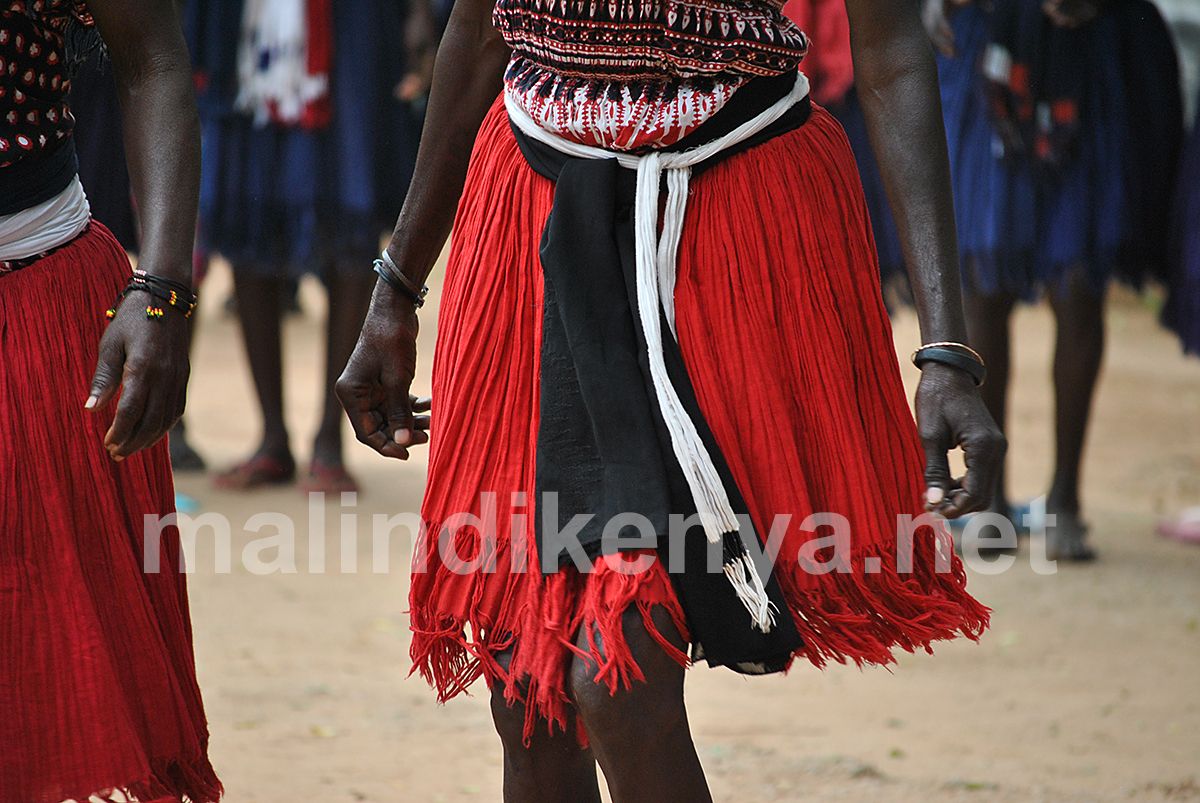
A tray full of grilled lobsters towered in the middle of the table surrounded by battered vegetables and basmati rice while the almost full moon rose from behind the huge baobab tree in the garden of the villa rented by Rossella and Ivo.
The Sappe proposed a toast dedicated to the great musician Ric Giambo, who had enchanted the entire giriama tribe.
I raised my glass and thanked everyone for their attention, while my ego, satiated by so many compliments, was in place for at least a year.
We sat down and began yet another fantastic meal, thanks to the skill of the cook, the freshness of the food, and the friendliness of the diners.
It was on the way home, when I was finally alone with my mentor, that I said to him.
"You know you're an asshole?"
"How do you see it?"
"I see a guy who knows. How do you see it?"
"That's right, I know," he replied, getting out of the car, "but you were great today!"
"I echoed him, without, for once, sinning in modesty.
"Tomorrow is another busy day: the naming ceremony. See you tomorrow morning at ten at the bar.
"And don't forget the double bass," I said, remembering that he had told me he had also been a jazz double bassist in his youth.
"Ha ha ha!" and he walked away laughing.
Knock knock.
A slit in my right eye, clouded by morning sleep, opened, just to receive a slap of light and close again immediately.
Knock, knock.
As another crack opened in my left eye, I realised that someone was knocking insistently on the door of my room.
Yawning, I mumbled "I'm coming!" and tried to untangle the mosquito net that surrounded the bed and that was enveloping me and turning me into a mummy.
I finally managed to untangle myself, put a sarong around my waist and opened the door. A young Kenyan man with a motorbike helmet on his head, smiling, handed me a parcel and waited.
I waited too, still groggy from sleep, until I realised the guy was waiting for a tip.
I rummaged in the pocket of his trousers hanging on a chair, handed him some coins and closed the door, wondering who had ever delivered a parcel.
I put it down on the coffee table and stood there for a second looking at it, then decided to give myself the sequence of priorities: shower and coffee, essential elements for me to consider myself awake and active.
Later, with the steaming cup in my hand, I sat down and examined the contents of the box.
It contained a beautiful red and white kanga and two thinner ones to become a scarf and belt, in short, the complete uniform of a male tadpole.
There was also an envelope, I opened it, unfolded the paper and read a pencilled note that said:
"The MADCA board liked you so much that this morning they resolved to give you this gift.
Consider it a rare privilege.
I'll tell you the rest in a moment.
Katana."
I recognised the Sappe's handwriting and style and the signature made me realise that he had already been adopted by the tribe and that this was his giriama name.
There he was, sitting alone at the table.
As usual he was waiting for me to offer him his ten o'clock coffee which, after a few minutes, arrived in a tray along with two small glasses of water. As always, it was miraculously good and ristretto as only Italians can appreciate it.
"I wondered why,' I said, 'outside Italy, apart from the enclave of Malindi, it is so difficult to get decent coffee. When I was in Holland, I learned to shout "Stop! Stop!" to the barista at the precise moment he pressed the brew button. I had calculated that his reaction time, before he realised that the cup was full enough for me, was just about right for me not to have a cup of broth".
"The difference," said the Sappe with the steaming cup in his hand, "lies in the fact that for the whole world coffee is a drink, while for the Italians it is an elixir. However, I found an answer to your question in New Zealand.
In my mind I applied yet another drawing pin to an imaginary planisphere already filled with markers testifying to the passages of my mentor, who continued: "In the port of Auckland, where I had moored the Belle Coralline, there was a grocery shop, with an automatic machine that dispensed good espresso coffee, not those soluble "crap". The problem was that the amount of water dispensed was pre-set, just enough to fill six-inch high paper cups to the brim. While everyone in the shop was looking at me as if I were crazy, I picked up a used glass from the wastebasket and held it with my left hand, while with my right hand I placed my clean glass under the dispenser and pressed the button. After a few seconds of dispensing, having reached the desired quantity, I would deftly replace the glasses and enjoy a good cup of coffee while the used glass continued to fill up with coloured water which was then thrown away".
"Clever trick," I said, "but you have not yet revealed to me why it is inconceivable for them to give little coffee.
"After a few days I got to know the manager and asked him the same question. He told me that for them, serving a few drops of coffee for the price of five dollars seemed like theft. If you pay a lot, you should at least drink a lot.
"There is a logic to it, if we consider it logical to swallow a barrel of coloured water,' I commented.
After the waiter had cleared the table, I put the letter I had found in the box under my friend's nose and, with the exaggerated air of an oratory actor, I asked, "Who is this Katana who sent me a parcel this morning?
"How do you see it?"
"I see, I see, I see that someone I know very well has already been adopted by the gyros complete with being given the same name as the most respected and esteemed elder, Katana Kalulu, and how do you see it?"
"I see it as... you either know or you ask, anyway," he said changing the subject, "congratulations my friend! You've managed to win over the entire MADCA and I have to admit that I liked you too, I almost shed a tear. Hold on tight: the Association Council has decided to adopt you: in fact, it has been decided that this afternoon you too will be christened with a giriama name".
"Really?" I asked incredulously
"No, in mock..." he retorted ironically.
"I'm really honoured."
"And also, to mark the occasion, KTN (Kenya Television Network) will also be coming to film the ceremony. Unfortunately, the news got away from me with a journalist friend who spread the word and made the Kenyan media curious.
"Knowing you, the news did not escape you, in my opinion you are helping our friends at MADCA to get a little more visibility. In Kenya there are more than forty tribes and the mijikenda are struggling not to be considered as the southerners were by us in the sixties."
"How do you see it?"
"I see it as my fridge, I'm a bit empty... I'm going to do some shopping, I'll see you at the MADCAs later."
"Two o'clock, right on time, bring your suit and... stay light at lunch, in fact if you want my advice, skip it!" concluded the Sappe as I went to pay for the coffees.
Everyone at MADCA was dressed up for a big party.
For the occasion, the most respected elders of the tribe had arrived to preside over the ceremony, including the revered ninety-year-old Mzee Katana Kalulu who, for the occasion, had worn a headdress adorned with shells and feathers.
Scarlett and Ivo were already ready with their colourful outfits and I slipped into a hut together with Sappe who helped me arrange my kanga, belt and scarf.
An army of dancers, singers and percussionists had lined up in a semicircle around the main hut, a cameraman with a large camera slung over his shoulder was already filming, squeezing through the few gaps available, and Munyaya at one point took the floor. After a long speech in Giriama and English explaining that on that day other brothers would be joining the family, he invited the 'baptisers' to come into the hut for... eat.
It's part of the ritual," Ivo told me, "among the rituals of all the cultures of the world, that of food is the most widespread: eating is conviviality, it's filling up with energy, it's a symbol of well-being, it's even offered to the dead and to the divinities. And you're lucky we're not in Cambodia, you'd have to eat fried locusts. Here at least we have sima, which is white polenta, and kid.
We sat down inside the hut on small wooden stools and I mentally thanked the Sappe for having advised me to skip lunch, with a few mouthfuls of sima you already feel full. It had to be taken - hot enough to scald your fingers - with your hands (which had been washed by a girl who came with a jug filled with water and lime), soaked in a tomato-based sauce and brought to your mouth. Then it was the kid's turn.
All very good, although the meat was, as always, a bit tough for our European teeth. The portions would have been enough to feed an army and at a certain point we gave up, - nothing was going to be thrown away anyway - we wiped our hands again and went out. The whole village was waiting for the actual start of the ceremony.
The poet Kazungu arrived, always smiling behind his glasses, holding two leather bags. The first one contained cards with the names of the families (which would be the patronymic as it is used in Africa), the other bag contained the proper names.
At each draw Kazungu read the name aloud, which was immediately repeated in chorus by all with shouts of joy.
I remember that Scarlett was christened Kache Mwagandi, Ivo was called Charo Kaingu and I became Yongo Bembere.
As soon as my second name was drawn, the last in the series, a party of rhythms, songs and dances broke out in which we were all involved.
The choirs were led in turn by old men and women.
The former had a hoarse, powerful voice and the latter reached piercing high notes, and soon after all those present responded in chorus while the drums beat out swirling rhythms. Not just drums, there were also metal objects being beaten, a tray containing pieces of glass clinking and, at one point, a slightly cross-eyed boy arrived playing a kind of proto-clarinet, a tube with holes in it with a reed tied with string and a very nasal sound.
The atmosphere was so engaging that it was impossible to sit still and watch.
I for one, who was never a great dancer, went wild as never before in my life.
Luckily, when we were all close to collapsing, a cook struck a pot with a ladle, at this signal the music and dancing stopped and everyone lined up to get their dose of sima and kid.
Rossella, Ivo and I, sweaty and out of breath, went to greet and shake hands with the elders, the council members and the TV crew and left the village in a daze.
From the next day on, it was difficult to walk through the streets of Malindi without being stopped by someone shaking my hand and saying, 'Yongo! I saw you on the news! Welcome to our tribe!"
...CONTINUED
TO READ THE PREVIOUS EPISODES, CLICK HERE:
https://malindikenya.net/en/articles/words/tales/the-sappe-and-giriama-wedding-part-2.html
https://malindikenya.net/en/articles/words/tales/the-sappe-and-giriama-wedding-part-1.html
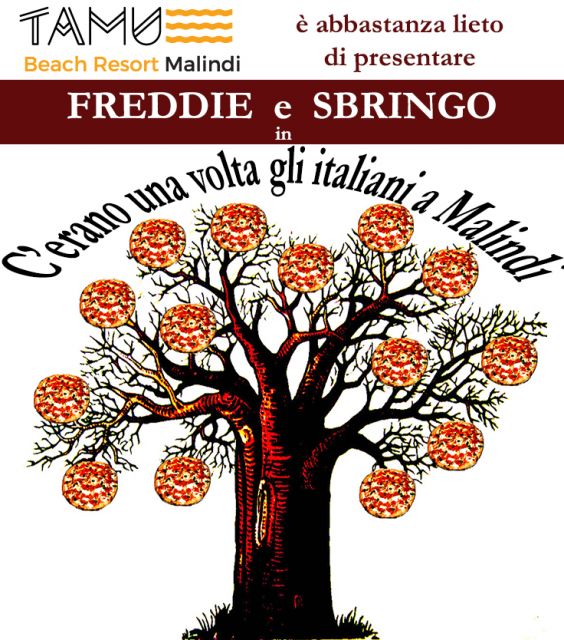
Another night for Freddie and Sbringo and their lucky show between songs and stories "Once ...
TALES
by Marco Sbringo Bigi
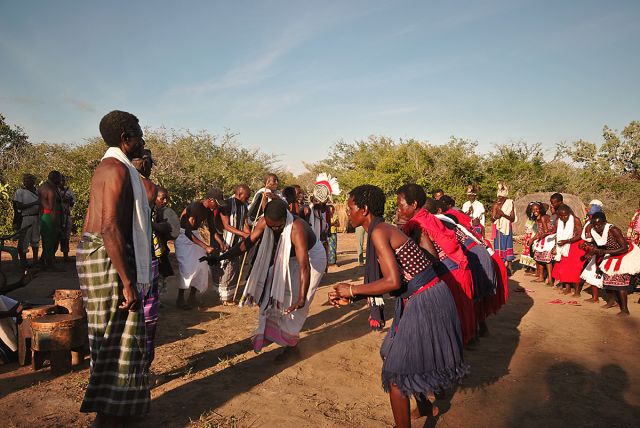
"I'll pick you up tomorrow morning at eight o'clock," Ivo said, and so it was.
A blast of...
SHOW
by Leni Frau

Already a full house in Malindi for the first of the five evenings in August of the new serial ...
EVENTS
by redazione
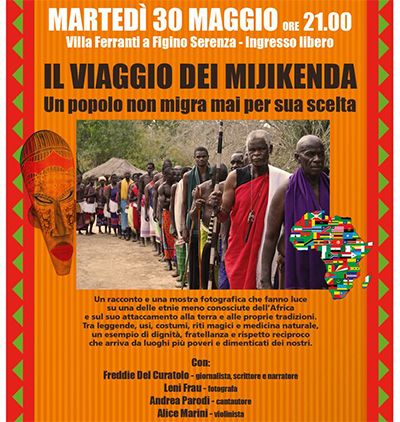
An evening of stories about Kenya and the Mijikenda ethnicity this Tuesday at Figino Serenza in the province of Como.
With free entrance, in the beautiful and elegant frame of Villa Ferranti, the headquarters of the municipal library, Malindikenya.net's director...
SHOWS
by redazione
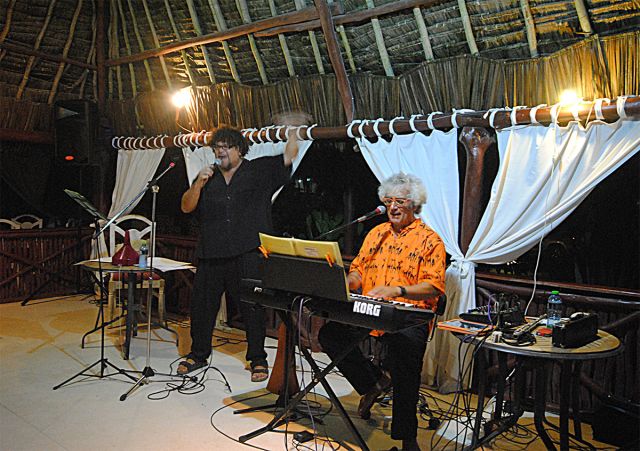
A Sunday night in Watamu for Freddie and Sbringo, who propose the worst of their repertoire...